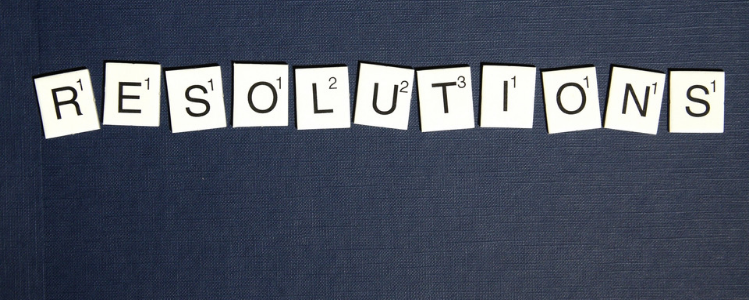5 New Year’s Resolutions for People in Recovery
With a few days until the end of the year, New Year’s resolutions are on the forefront of many people’s minds. I’ve seen countless lists focused on weight loss, exercise, and huge life changes (I WILL NOT hit snooze! I will call my grandparents EVERY SUNDAY! etc.), and I wanted to create a list that was a bit different. These are my five New Year’s resolutions for people in recovery:
1. Start a gratitude list
When we’re struggling with recovery, we tend to focus on the negatives. We become so fixated on everything that’s going wrong and all of the things in our life that are bad, that we also end up losing sight of all the good that still exists. Break the habit this year by starting off each day or finishing each night with a gratitude list. Try to write down at least one thing you are thankful for in your life. Whether it is having a supportive friend, a pet who gives you unconditional love, a comfy bed to sleep in each night, sunshine and cool breezes, or a body that lets you move and hug people and participate in the world – use your gratitude list as a reminder that there is so much in your life to keep fighting for.
2. Make time each day to list at least one thing you are proud of yourself for
The accomplishments can be as big as going a month without using behaviors, eating a fear food, choosing to go into treatment, and following your meal plan for a week; or as small as getting out of bed, going to a therapy appointment, texting your therapist when you have an urge to use behaviors, and challenging an eating disorder thought. If you have trouble thinking of things, ask friends and family members you trust to help you out. It can be difficult to feel like you’re progressing in your recovery when you’re struggling, but making a list of positive steps forward and parts of your journey that you’re proud of can act as proof that you are progressing – no matter how small your steps are.
3. Create new, self-care rituals in place of old, self-destructive ones
If you have a habit of body checking when you get up in the morning, replace it with reading an affirmation. If you struggle with urges to exercise at night before you go to bed, create a ritual where you light a candle and journal to reflect on your day. If you tend to browse celebrity gossip websites and unconsciously compare yourself, replace it with reading positive quotes, listening to an inspirational ted talk, or watching a funny video on YouTube. It may feel silly or unhelpful in the moment, but the more time you spend doing the new ritual, the less power the old one will have over you.
4. Change your environment
Staying in recovery becomes increasingly difficult when you are surrounded by an unhealthy and triggering environment. Make this the year you cut out toxic people and influences from your life in order to create new, positive and recovery conducive surroundings. Unfriend triggering friends from Facebook. Set boundaries with toxic people – those you cannot avoid – about what you are not willing to tolerate. Instead of waiting for people to support you, use your voice and ask for what you need. Stop visiting triggering sites and places, and start consuming media and being in spaces that make you feel peaceful and empowered. Make a note of the people, places, and activities that make you feel loved and alive, and do your best to incorporate them into your life. Changing your environment and the people you surround yourself with in this way can feel mean and even selfish. But the truth is that it’s an act of self-care. You deserve to exist in a space that feels safe and conducive to your recovery. You deserve to voice your feelings and stand up for yourself. And you deserve to cut out things and people from your life that bring you down. You are allowed to put yourself first.
5. Allow yourself to make mistakes
The New Year can put a lot of pressure on us to perform perfectly. Often times, we set high, even impossible, standards for ourselves and create expectations that can lead to feelings of shame and inadequacy if we are unable to meet them. But the reality is that recovery and life are not perfect. We are not perfect. We mess up, take wrong turns, and make poor choices sometimes – and that’s okay. Making mistakes and being imperfect does not make you a failure as a person or a failure at recovery – it makes you human. So instead of putting pressure on yourself to do recovery perfectly, give yourself permission to make mistakes and be a human being.
This said, letting go of perfection is not an excuse to engage in behaviors. It’s an acknowledgment that you can make mistakes in recovery, and still be capable of getting better. It‘s a reminder that your missteps and struggles do not discount your accomplishments and steps forward. And it’s recognizing that you can mess up and disappoint people and still be loved and valued. Your worth as a person is not discounted by the fact that you’re struggling, and your ability to recover is not diminished by the mistakes you make. You’re doing the best you can to fight the darkness you feel and take care of yourself, and that’s all you can ask of yourself. Regardless of the mistakes you make, you are capable of recovery, and you are enough.
Daniell is a student at CSU Channel Islands where she majors in psychology. She is the creator behind an online space called the Internal Acceptance Movement (I. A.M.) which touches on issues involving mental health, recovery, self-care, gender, sexuality, and social justice. She is also an aspiring writer and eating disorder activist who hopes to challenge the stigma surrounding mental illness by speaking openly about mental health and her own journey to recovery from anorexia and bulimia.
This content was originally published on Proud2bme.org in 2015.





